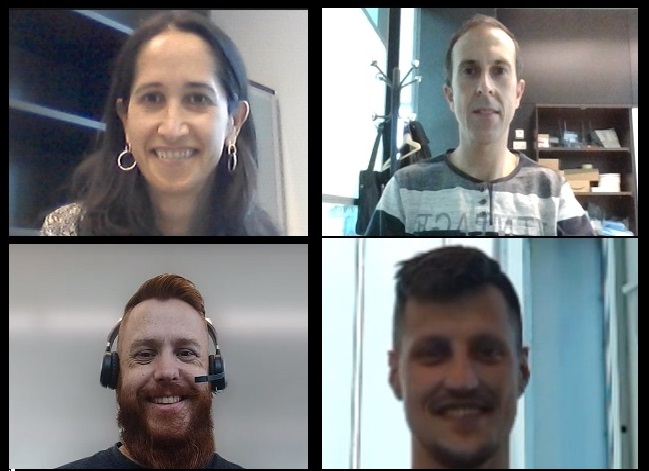For more than 2 years, TST has been a key member of the M-Sec consortium, supporting the development and testing of a technology that intends to support our cities to become smarter and, at the same time, more cyber secure. Meet the team and work behind TST, their role in the M-Sec Project and where will they go next
We spoke with Arancha Sanz, Telecommunications Engineer, to know more about the Spanish company’s role in the Project.
1. Arancha, thank you so much for agreeing with this interview. Please briefly present yourself and the company you work at.
I am Arancha Sanz. I am a Telecommunications Engineer with more than 20 years of experience in Wireless/IoT Industry. I have long experience in mobile radio networks planning and optimization, having worked on cellular deployments for different telecom carriers worldwide. Since 2007 I joined TST as Operations and Customer Facing Project Manager and I am currently leading a broad range of product design and development projects and cross-functional teams coordination for high-tech and IoT products manufacturing.
TST is an engineering company focused on IoT custom products development, covering the whole project life cycle, from the design to the prototyping, industrialization, manufacturing and mass production. TST was founded in 2007 by a partnership between entrepreneurs from the research and university world and business managers with a long experience of starting-up and growth of technology-based companies. TST´s team has a strong expertise on electronics, radiofrequency, wireless communications and production technologies, which allows to deliver cutting-edge IoT products to fulfil the most demanding customer requirements. The main market sectors in which TST operates are Industry 4.0, Logistics, Agrifood, Smart Water Metering and Smart Waste.
2. Why have you and TST decided to join the M-Sec Project?
TST intends to deliver the most innovative products to their customers. In that sense, it has been involved from the very beginning in Research and Development projects within the framework of national and international collaborative programs as H2020, FP7, ECSEL and CELTIC. The main purpose of these research activities is to get the know-how and to learn about new features which can be integrated in our current products and in the future products to be designed for our customers.
The topics of research are IoT networks and devices, smart applications and future networks. TST´s main interest for joining the M-Sec consortium is to get knowledge on security features at hardware and software level, to be implemented in our IoT sensor devices, ensuring the integrity and confidentiality and mitigating the risks from external attacks. Besides, the collaboration with other partners working on a cross-border Smart City project is also a big motivation and it is aligned with our international expansion to the Japanese market.
As operations and customer-oriented project manager I´m taking care of providing the maximum value to our customers. Our IoT products must be designed with digital security as one of the main product requirements, in order to ensure the integrity and data confidentiality and mitigate cybersecurity risks. I´m excited to be part of M-Sec Project, working on achieving TST´s goals and closely collaborating with other technical and non-technical partners in becoming the M-Sec solution a reality in the Smart City context.
3. Can you also present the team that works with you for the M-Sec Project?
A cross functional team is participating in M-Sec project working on research, engineering and validation activities. The team is composed by 1 technical manager, 1 hardware engineer, 1 embedded software engineer and 1 application developer.
4. What has been the main role of TST at the M-Sec Project and have you been able to achieve all you have set for? What were your and your team’s main challenges?
TST is one of the technical partners, contributing to the Use Cases definition, setup of the pilots, integration and validation, system requirements, risks and IoT security elements implementation. TST is also the owner of Use Case 1 Secured IoT devices to enrich strolls across Smart City parks.
Fortunately, TST has been able to achieve all we have set for.
5. Looking back on what you and your team have done in the scope of the M-Sec Project, what are your main takeaways?
Main achievements from TST are related to the design and development of IoT devices with embedded security layer for secure encryption and decryption of data. Two types of devices have been designed. One of them is an environmental sensor able to detect temperature, humidity, CO2, VOC and noise. The other one is a scanner device able to detect Wi-Fi MAC addresses used to estimate the size of a crowd in a certain area. The secured IoT devices have been implemented within the Use Case 1 to be deployed in the Spanish City of Santander. The end users can access to the data collected through a login process in a web application within the M-Sec platform.
Research projects always bring lessons learned, specially related to technical issues coming up on engineering, prototyping and validation phases, which have been solved in our internal quality process and with the close collaboration with the rest of the partners.
Other important main challenge has been related to the Covid-19 scenario which has brought another way of work in terms of the project partners collaboration and also in terms of the use cases approach considering the total lock-down scenario.
6. With only a few months until the end of the project, on what major developments do you and your team still need to focus? Do you feel confident?
TST is currently testing the IoT sensors belonging to Use Case 1 before being deployed in the real scenario. The pilot with final users will start at the beginning of July and will be running for 3 months. TST is also working on the integration of other M-Sec components to provide application security level on higher layers to be compliant with GPDR.
7. Did you find this experience of participating in an EU-JP partnership rewarding?
TST participation in an EU&JP partnership has been very rewarding. The cooperation with different partners, different capacities, and different cultures (European and Japanese) in all the project stages has been a great opportunity to learn in both technical and non-technical areas.
TST is confident to release future products which will provide security features as the ones integrated into the M-Sec sensor devices. IoT security is one of the current main research topics and TST is very interested in being involved in future related R&D projects in cooperation with other partners.


